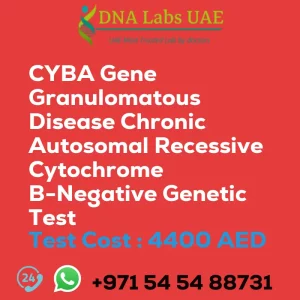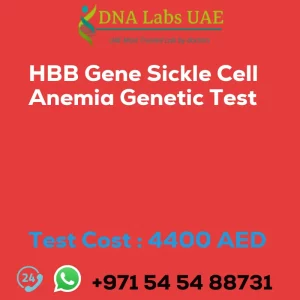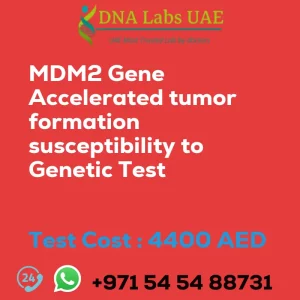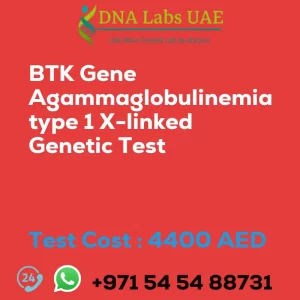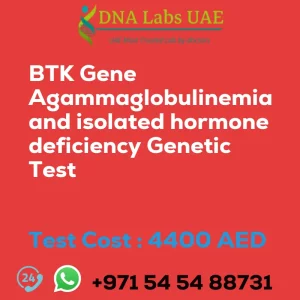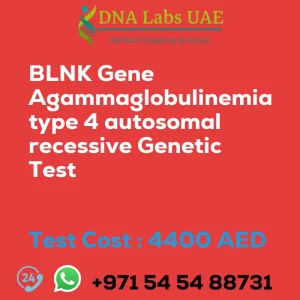VPS45 Gene Neutropenia severe congenital type 5 autosomal recessive Genetic Test
Test Name: VPS45 Gene Neutropenia severe congenital type 5 autosomal recessive Genetic Test
Components: NGS Technology
Price: 4400.0 AED
Sample Condition: Blood or Extracted DNA or One drop Blood on FTA Card
Report Delivery: 3 to 4 Weeks
Test Type: Hematology
Doctor: Hematologist
Test Department: Genetics
Pre Test Information: Clinical History of Patient who is going for VPS45 Gene Neutropenia, severe congenital type 5, autosomal recessive NGS Genetic DNA Test. A Genetic Counselling session to draw a pedigree chart of family members affected with VPS45 Gene Neutropenia, severe congenital type 5, autosomal recessive NGS Genetic DNA Test gene VPS45
Test Details: The VPS45 gene is associated with a rare genetic disorder called severe congenital neutropenia type 5. This condition is characterized by a severe deficiency of neutrophils, a type of white blood cell that plays a crucial role in fighting off infections. Autosomal recessive inheritance means that an individual must inherit two copies of the mutated VPS45 gene, one from each parent, in order to develop the disorder. If only one copy is inherited, the individual is considered a carrier and does not typically show symptoms.
NGS (Next Generation Sequencing) genetic testing is a type of DNA sequencing technology that allows for the analysis of multiple genes simultaneously. In the case of severe congenital neutropenia type 5, NGS genetic testing can be used to identify mutations in the VPS45 gene, providing a definitive diagnosis for affected individuals. This genetic test can be beneficial for individuals with symptoms suggestive of severe congenital neutropenia type 5, as it can help confirm the diagnosis and guide appropriate management and treatment options. It can also be used for carrier testing in individuals with a family history of the disorder, allowing them to make informed reproductive decisions.
It is important to note that genetic testing should always be done under the guidance of a healthcare professional, who can provide appropriate counseling and support throughout the testing process.
| Test Name | VPS45 Gene Neutropenia severe congenital type 5 autosomal recessive Genetic Test |
|---|---|
| Components | |
| Price | 4400.0 AED |
| Sample Condition | Blood or Extracted DNA or One drop Blood on FTA Card |
| Report Delivery | 3 to 4 Weeks |
| Method | NGS Technology |
| Test type | Hematology |
| Doctor | Hematologist |
| Test Department: | Genetics |
| Pre Test Information | Clinical History of Patient who is going for VPS45 Gene Neutropenia, severe congenital type 5, autosomal recessive NGS Genetic DNA Test. A Genetic Counselling session to draw a pedigree chart of family members affected with VPS45 Gene Neutropenia, severe congenital type 5, autosomal recessive NGS Genetic DNA Test gene VPS45 |
| Test Details |
The VPS45 gene is associated with a rare genetic disorder called severe congenital neutropenia type 5. This condition is characterized by a severe deficiency of neutrophils, a type of white blood cell that plays a crucial role in fighting off infections. Autosomal recessive inheritance means that an individual must inherit two copies of the mutated VPS45 gene, one from each parent, in order to develop the disorder. If only one copy is inherited, the individual is considered a carrier and does not typically show symptoms. NGS (Next Generation Sequencing) genetic testing is a type of DNA sequencing technology that allows for the analysis of multiple genes simultaneously. In the case of severe congenital neutropenia type 5, NGS genetic testing can be used to identify mutations in the VPS45 gene, providing a definitive diagnosis for affected individuals. This genetic test can be beneficial for individuals with symptoms suggestive of severe congenital neutropenia type 5, as it can help confirm the diagnosis and guide appropriate management and treatment options. It can also be used for carrier testing in individuals with a family history of the disorder, allowing them to make informed reproductive decisions. It is important to note that genetic testing should always be done under the guidance of a healthcare professional, who can provide appropriate counseling and support throughout the testing process. |


